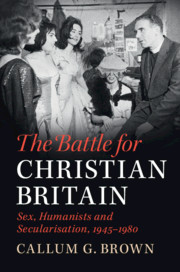Book contents
- The Battle for Christian Britain
- The Battle for Christian Britain
- Copyright page
- Contents
- Preface
- Acknowledgements
- Abbreviations
- Part I The Battle in Context
- Part II The Heyday of Christian Vigilance 1945–1965
- 2 Moral Vigilance
- 3 Licensing at the Front Line
- 4 Licensing in the Provinces
- 5 The Battle at the Beeb Part 1
- Part III The Sixties Crisis and Its Legacy 1965–1980
- Part IV Conclusion
- Bibliography
- Index
5 - The Battle at the Beeb Part 1
from Part II - The Heyday of Christian Vigilance 1945–1965
Published online by Cambridge University Press: 28 September 2019
- The Battle for Christian Britain
- The Battle for Christian Britain
- Copyright page
- Contents
- Preface
- Acknowledgements
- Abbreviations
- Part I The Battle in Context
- Part II The Heyday of Christian Vigilance 1945–1965
- 2 Moral Vigilance
- 3 Licensing at the Front Line
- 4 Licensing in the Provinces
- 5 The Battle at the Beeb Part 1
- Part III The Sixties Crisis and Its Legacy 1965–1980
- Part IV Conclusion
- Bibliography
- Index
Summary
The BBC emerged from the Second World War as the critical adjunct to the religious culture of Britain, and this the churches sought to defend with ferocity through the power of the Central Religious Advisory Committee (CRAC). This formed a close alliance with the employees of the Religious Broadcasting Department. Down to the mid-1960s, CRAC effectively forced the management of the BBC to allow broadcasters to perform evangelising functions, and to keep Humanists and atheists from using the mic to disseminate their life stances or to attack religion. A group of influential religious employees, including the senior administrator Harman Grisewood, imposed a discrete but firm anti-secular policy upon the corporation until the 1960s. This became firmer, not weaker, as the period progressed, so that the few broadcasts on atheism were concentrated in the late 1940s rather than the 1960s.
- Type
- Chapter
- Information
- The Battle for Christian BritainSex, Humanists and Secularisation, 1945–1980, pp. 116 - 146Publisher: Cambridge University PressPrint publication year: 2019
- 1
- Cited by

